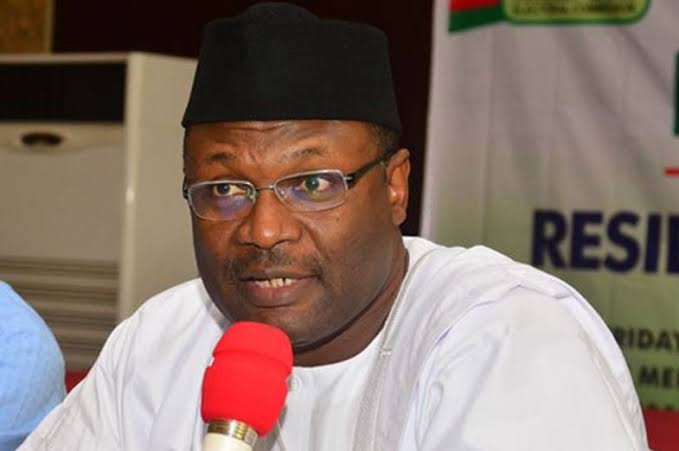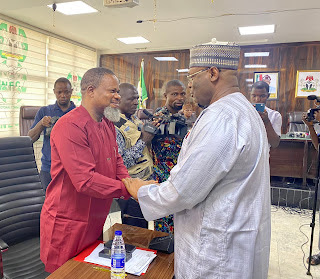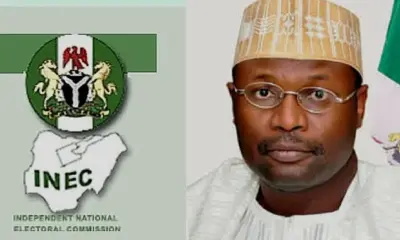Politics
Off-cycle elections: INEC urges media to combat fake news, promote ethical reporting

The Independent National Electoral Commission, INEC, has urged the media to actively combat the spread of fake news and misinformation while promoting ethical reporting, ahead of the off-cycle Kogi, Imo, and Bayelsa governorship elections set for November 11, 2023.
The commission shed light on the alarming prevalence of fake news in Nigeria’s electoral landscape, drawing attention to the disastrous implications it can have on the integrity of the electoral process and the country’s stability.

The national commissioner and member of the Information and Voter Education Committee of the Commission, Prof Kunle Ajayi disclosed this while speaking during a two-day capacity-building workshop for INEC Press Corps on Ethical, Safety Practices and Critical Issues Relating to the Kogi, Imo and Bayelsa Governorship Election organized INEC in partnership with the INEC Press Corps, and DAI in Akwanga, Nasarawa State.
He said, “I would like at this juncture, to draw the attention of all media representatives here present today to a crucial issue that poses a serious threat to the election process in Nigeria, that is the issue of fake news. The Commission’s distasteful experience with fake news in the 2023 General Elections has shown that, if not nipped in the bud, fake news can become the bane of election management in Nigeria”
According to Ajayi, disinformation, ‘fake news,’ hate speech, and the weaponization of disinformation have become troubling trends. These tactics are employed to provoke religious, political, and tribal sentiments in an already polarized society, especially during election season.
The consequences of such propaganda often manifest in electoral violence and uprisings, posing a significant threat to the nation’s peace and stability.
“The alarming prevalence of misinformation, ‘fake news’, hate speech, and the weaponization of disinformation has become very worrisome to the Commission. Disinformation is used to provoke religious, political, and tribal sentiments in an already polarized society such as ours, especially, during election season, which is often the leading cause of electoral violence and uprisings.”
He noted that election-related disinformation has emerged as a major strategy used by unscrupulous individuals and groups in the political sphere to manipulate public opinion, often at the expense of the integrity of the electoral process and the country as a whole.
“Election-related disinformation has become a major strategy used by nefarious individuals and groups in the political space to manipulate the general public to their advantage, regardless of the consequential effect such propaganda may have on the peace and stability of the electoral process and the country at large.”
The media, as the fourth estate of the realm, plays a pivotal role in shaping public opinion and influencing the outcome of elections. Recognizing this, INEC has established a long-standing partnership with the media, with over 100 members of the INEC Press Corps representing various media organizations in the country.
This collaboration is integral to providing voter education, disseminating electoral information, and contributing to the overall success of INEC’s activities.
The media’s influence extends to the election season, where their role in covering electoral processes becomes particularly critical. Elections in Nigeria are marked by heightened media coverage and reporting.
“Consequently, to create an environment of peace where the electorate feels safe and free to come out to exercise their franchise on election day, we, therefore, appeal to the media in general to be objective and unbiased in their reporting and avoid fake news and inflammatory and sensational news.
“The Press must commit to delivering thorough, verified, and unbiased information, pulled from credible sources to the public. At the same time, they must refrain from reporting information that encourages divisions or antagonistic discussions, which are likely to incite violence or endanger social life.”
Given this context, Prof. Ajayi implored the media to act with professionalism, uphold journalistic ethics, and adhere to high reporting standards. Journalists are called upon to deliver thorough, verified, and unbiased information drawn from credible sources to the public.
Simultaneously, they must refrain from disseminating information that encourages divisions or incites violence, endangering social harmony and stability.
To ensure free, fair, credible, and inclusive elections, Prof. Ajayi urged the media to be factual, objective, and professional in their reportage of the Commission’s activities, both pre-election and post-election.
He emphasized that journalists covering the elections should not interfere with the voting processes or distract the attention of Presiding Officers during the performance of their duties.
“On our part, as an electoral body, we will remain transparent in all our activities and consequently communicate all relevant information to the media. When necessary, feel free to fact-check any considered grey areas for clarity from the Voter Education and Publicity (VEP) Department of the Commission,”
In his address,Chairman of the Independent National Electoral Commission,INEC, Professor Mahmood Yakubu emphasized the Commission’s recognition of the vital role the media plays in the nation’s political and electoral processes. He highlighted that a thriving democracy depends on a free and vibrant media.
He said, “However, a free and vibrant press is also obliged to adhere to professional and ethical standards. Indeed, true democracy cannot exist without effective information flow. Basically, and as established over time, the role of the media, especially the INEC Press Corp in the electoral process is to:
a. Avail the stakeholders with timely and relevant information pertaining to the electoral process;
b. Carry out voter education and public enlightenment;
c. Mobilize the electorate to participate in the electoral process through awakening in them, the consciousness of taking ownership of the political process;
d. Give visibility and life to the programmes and activities of the Election Management Body with a view to updating stakeholders on the developments in the electoral process;
e. Publicize information and activities of political parties and candidates, with a view to assisting the electorate make informed decisions and choices; and
f. Ensure through their searchlight and reports that the process and rules of engagement in the electoral system as codified in the electoral legal framework are duly complied with.
“As first-hand witnesses to the Commission’s activities, the INEC Press Corps members also become the repository of electoral information in Nigeria. This places them at an advantageous position to play important roles in shaping the opinions and editorial policies of their media organizations on issues relating to the programmes and policies of the Commission.”
“The implication is that Press Corps members must be familiar with the Constitutional mandate of the Commission and the roles and powers ascribed to it. They must therefore strive to understand the intent and nuances of the powers granted to the Commission by the Constitution and the Electoral Act that are expressed in subsidiary legislations including the Commission’s Regulations, Guidelines and Manuals,”he said.

























